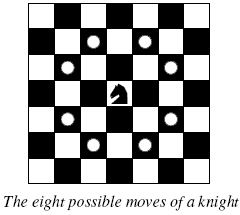原题链接:http://poj.org/problem?id=2488
我的链接:http://acm.hust.edu.cn/vjudge/contest/view.action?cid=19651#problem/A
A Knight's Journey
| Time Limit: 1000MS | Memory Limit: 65536K | |
| Total Submissions: 23452 | Accepted: 7944 |
Description
 Background
Background
The knight is getting bored of seeing the same black and white squares again and again and has decided to make a journey
around the world. Whenever a knight moves, it is two squares in one direction and one square perpendicular to this. The world of a knight is the chessboard he is living on. Our knight lives on a chessboard that has a smaller area than a regular 8 * 8 board, but it is still rectangular. Can you help this adventurous knight to make travel plans?
Problem
Find a path such that the knight visits every square once. The knight can start and end on any square of the board.
Input
The input begins with a positive integer n in the first line. The following lines contain n test cases. Each test case consists of a single line with two positive integers p and q, such that 1 <= p * q <= 26. This represents a p * q chessboard, where p describes how many different square numbers 1, . . . , p exist, q describes how many different square letters exist. These are the first q letters of the Latin alphabet: A, . . .
Output
The output for every scenario begins with a line containing "Scenario #i:", where i is the number of the scenario starting at 1. Then print a single line containing the lexicographically first path that visits all squares of the chessboard with knight moves followed by an empty line. The path should be given on a single line by concatenating the names of the visited squares. Each square name consists of a capital letter followed by a number.
If no such path exist, you should output impossible on a single line.
If no such path exist, you should output impossible on a single line.
Sample Input
3 1 1 2 3 4 3
Sample Output
Scenario #1: A1 Scenario #2: impossible Scenario #3: A1B3C1A2B4C2A3B1C3A4B2C4
Source
TUD Programming Contest 2005, Darmstadt, Germany
算法:DFS + 回溯
题意:骑士周游列国问题,说白了就是任一给你一个棋盘(当然满足格子数小于26)
让你从第一个格子按照图中所给的马走日的步法
不重复遍历走完整个棋盘。然后按照字典序输出路径即可
思路:按照图中的八个方向dfs即可。
注意: 1.回溯的用法,千万别忘了还原状态。
2.路径的输出,字典序的是列。。。
/******************************************************
//A Accepted 148 KB 0 ms C++ 1259 B
题意:骑士周游列国,马走日八个方向走,同时也要注意字典序
最后是按照字典序输出的
注意:先输入列再输入行
*******************************************************/
#include<stdio.h>
#include<string.h>
const int maxn = 30;
int vis[maxn][maxn];
int n,m;
int dir[8][2] = {-2,-1, -2,1, -1,-2, -1,2, 1,-2, 1,2, 2,-1, 2,1};
//注意方向也要按照字典序来 ,否则WA的好惨。。。
struct Path{
int x,y;
}p[maxn];
int flag;
void dfs(int x, int y, int step)
{
if(flag) return;
p[step].x = x;
p[step].y = y;
if(step == n*m)
{
flag = 1;
return;
}
Path next;
for(int i = 0; i < 8; i++)
{
next.x = x+dir[i][0];
next.y = y+dir[i][1];
if(next.x >= 1 && next.x <= n && next.y >= 1 && next.y <= m && !vis[next.x][next.y])
{
vis[next.x][next.y] = 1;
dfs(next.x, next.y, step+1);
vis[next.x][next.y] = 0;
}
}
return;
}
int main()
{
int T;
scanf("%d", &T);
for(int t = 1; t <= T; t++)
{
scanf("%d%d", &m,&n); //先输入列再输入行
memset(vis,0,sizeof(vis));
memset(p,0,sizeof(p));
flag = 0;
vis[1][1] = 1;
dfs(1,1,1);
printf("Scenario #%d:\n", t);
if(flag)
{
for(int i = 1; i <= n*m; i++)
printf("%c%d", p[i].x-1+'A', p[i].y);
printf("\n");
}
else printf("impossible\n");
if(t != T) printf("\n");
}
return 0;
}

























 346
346

 被折叠的 条评论
为什么被折叠?
被折叠的 条评论
为什么被折叠?








